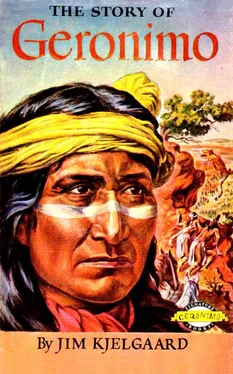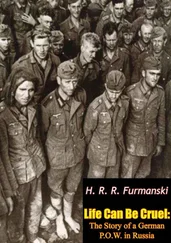Jim Kjelgaard - The Story of Geronimo
Здесь есть возможность читать онлайн «Jim Kjelgaard - The Story of Geronimo» — ознакомительный отрывок электронной книги совершенно бесплатно, а после прочтения отрывка купить полную версию. В некоторых случаях можно слушать аудио, скачать через торрент в формате fb2 и присутствует краткое содержание. Жанр: unrecognised, на английском языке. Описание произведения, (предисловие) а так же отзывы посетителей доступны на портале библиотеки ЛибКат.
- Название:The Story of Geronimo
- Автор:
- Жанр:
- Год:неизвестен
- ISBN:нет данных
- Рейтинг книги:4 / 5. Голосов: 1
-
Избранное:Добавить в избранное
- Отзывы:
-
Ваша оценка:
- 80
- 1
- 2
- 3
- 4
- 5
The Story of Geronimo: краткое содержание, описание и аннотация
Предлагаем к чтению аннотацию, описание, краткое содержание или предисловие (зависит от того, что написал сам автор книги «The Story of Geronimo»). Если вы не нашли необходимую информацию о книге — напишите в комментариях, мы постараемся отыскать её.
The Story of Geronimo — читать онлайн ознакомительный отрывок
Ниже представлен текст книги, разбитый по страницам. Система сохранения места последней прочитанной страницы, позволяет с удобством читать онлайн бесплатно книгу «The Story of Geronimo», без необходимости каждый раз заново искать на чём Вы остановились. Поставьте закладку, и сможете в любой момент перейти на страницу, на которой закончили чтение.
Интервал:
Закладка:
Before long a black horse, flanked by a gray and four bays, jumped down into the wash, ran across it, and stopped. They stared back in the direction from which they had come, and the tethered horses raised their heads to stare too. Geronimo thought that the black was a wonderful stallion and was surely stolen from some Mexican rancheria because no Papagoes bred horses so fine.
Now more horses came galloping over the desert until there was a herd of about eighty milling around in the wash. For the most part they were scrawny Papago ponies. But Geronimo saw one more fine stallion, a dark gray with black spots.
Riding stolen ponies, which they guided without help of saddle or bridle, Delgadito and his raiders were on the heels of the last horses. As their mounts jumped into the wash they slid off. Delgadito made his way to Geronimo and looked down at the dead Papago.
"How is this?" the chief asked.
"He would have stolen our horses," Geronimo replied.
"Was he alone?"
"There was another," the boy admitted. "I did not kill him."
"You should have," Delgadito scolded. "But come now and mount."
Geronimo ran with him to the picket line and mounted his mother's old stallion, then he was astounded to see Delgadito take time to strip saddle and bridle from his own horse and put them on the apaloosa. Geronimo marveled. This was enemy country and, when the Papagoes discovered that some of their horses had been stolen, they were sure to launch a hot pursuit. But Delgadito seemed as calm as he had ever been at home in his own wickiup.
Mounting the apaloosa and whooping at the top of his voice, Delgadito charged the herd. The other riders took off, one after another, and drove the horses full speed straight north. This puzzled Geronimo. Finally he rode over to talk with Nadeze.
"Why do we go north?" he asked. "Our home is almost due east."
"Worry not and question not," Nadeze said coolly. "Look and learn."
Always at full gallop, Delgadito was racing from one end of the line to the other. The apaloosa already had run at least six times the distance any other horse had traveled.
About an hour and a half later Delgadito caught his own horse and transferred saddle and bridle from the apaloosa to him. The exhausted apaloosa staggered ten feet to stand with head drooping. Geronimo finally understood.
Beyond any doubt, Papago trackers were already on the trail of Delgadito's Mimbreno raiders. They could not fail to find the weary apaloosa and they would know its owner was the shaman of the White Mountain Apaches. They would also see that the stolen horses had been started northward, toward the home of these Apaches. Thus the Papagoes would think that they had been raided by men from the White Mountain tribe and they would seek revenge on them, rather than on the Mimbreno Apaches.
"We have a wise chief," thought Geronimo, as Delgadito's plan became clear to him.
Just then Delgadito said, "Chie, continue northward with thirty of the more worthless horses. Leave a plain trail, as though we were stricken with panic. But drive the horses back and forth so it will appear as though there were many more than thirty. Run as soon as you see pursuers."
Chie nodded, and the rest of the men started dividing the remaining horses into smaller groups.
"Why do we do this?" Geronimo asked, riding along beside Nadeze.
"It is easier to hide the trail of a small group of horses," said Nadeze. "And the Papagoes will find it much more difficult to track us since we will take each herd in a different direction before swinging back to our village."
"Do I drive some?"
"You are too anxious, stripling." Nadeze was far more respectful since Geronimo had slain the Papago. "You will ride with one of us."
Suddenly the rain clouds which Geronimo had noticed earlier loosed an earth-battering torrent. The raiders smiled. Usan, god of their tribe, had indeed blessed them. Though the Papago trackers would certainly find the apaloosa, they would never discover where the rest of the horses had gone after a storm such as this one.
Driving all the horses ahead of them through the pouring rain, the raiders turned homeward.
In bright sunlight next day, the stolen Papago horses cropped grass on the slope opposite Delgadito's wickiup. Geronimo listened anxiously while Delgadito, as was the right of a chief who led a raiding party, divided the plunder.
The leader reserved twenty horses for himself, and the twenty he chose included the two fine stallions. Then he gave smaller numbers of horses to the four men who had gone with him. The number each received depended on how hard he had worked to make the raid successful. Next came a just share for all families who had no one to steal horses for them.
Geronimo's heart sank as the horses were given away. He had hoped to get something for himself, but now the only horses remaining were a dozen or so fit only for the cooking pot. Delgadito declared them as such. Then he announced, so that all could hear:
"I give part of my portion, the black stallion and the gray stallion with black spots," he swung to Geronimo, "to an Apache youth who deserves them because during this raid he behaved like a warrior."
For a moment Geronimo was too surprised and delighted to move. Then he tilted his head, squared his shoulders, and went proudly forth to claim his prizes.
CHAPTER THREE – Alope
It was spring in the year 1846, five years after Geronimo's first raid. Ten miles south of the Arizona-Mexico border, Geronimo sat silently on the summit of a low hill. His knife was on his belt. His muzzle-loading rifle, powder horn, and bullet pouch were in easy reach. A red blanket was draped over his body, which was naked except for breech cloth, moccasins, and the warrior's headband that bound his black hair.
Two young warriors, Zayigo and Pedro Gonzalez, sat beside him. Both were older than Geronimo. Yet both had chosen to let the seventeen-year-old warrior lead this raid into Mexico because of his cunning and courage.
Now they were a little uneasy because of their leader's silence. Usually Geronimo loved to talk, and he was already a leading orator among the Mimbreno Apaches. When he was least talkative, he was most dangerous. Finally Zayigo said impatiently:
"We sit beside the youngest Mimbreno Apache ever to become a member of the Council of Warriors. Yet he sulks like a scolded child. It ill befits him."
"Aye," Pedro Gonzalez agreed. "Since leaving the Mimbreno village, Geronimo, you have smoldered like a fire that is not quite able to burst into flame. Is it because some warriors spoke against you when they met to determine whether you might be admitted to the Council?"
"I care not who speaks against me," Geronimo said sourly. "Any who consider me unworthy of being a Mimbreno warrior I'll fight gladly."
"Those who did not want to admit you to the Council of Warriors never questioned your bravery or your skill in battle," Zayigo said quickly. "They said only that you are reckless and headstrong, and that trouble goes where you do because you never reckon the odds."
"There are some Mimbreno warriors who have the cowardly souls of Mexicans," Geronimo grunted. "And I do not mean that you are a coward, Pedro."
Pedro Gonzalez said quietly, "Mexican I was once. Apache I am now."
That was true. Captured in Mexico when he was five years old, Pedro had been adopted by an Apache family. He had taken so readily to Apache ways that he was now one of their finest and fiercest warriors. He spoke again:
"If you care not because some spoke against you, what is the trouble? It is no pleasure to go raiding or anywhere else with one who does little except stew in his own anger."
Geronimo said bitterly, "Ne-po-se was one of the men who spoke against me."
Читать дальшеИнтервал:
Закладка:
Похожие книги на «The Story of Geronimo»
Представляем Вашему вниманию похожие книги на «The Story of Geronimo» списком для выбора. Мы отобрали схожую по названию и смыслу литературу в надежде предоставить читателям больше вариантов отыскать новые, интересные, ещё непрочитанные произведения.
Обсуждение, отзывы о книге «The Story of Geronimo» и просто собственные мнения читателей. Оставьте ваши комментарии, напишите, что Вы думаете о произведении, его смысле или главных героях. Укажите что конкретно понравилось, а что нет, и почему Вы так считаете.












